Can Hamsters Eat Cabbage? The Complete Guide to Safe Feeding
Yes, hamsters can safely eat cabbage as an occasional treat when given in properly controlled portions but feed them cabbage in moderation. Syrian hamsters can enjoy half a teaspoon of fresh cabbage once or twice weekly, while dwarf hamsters should receive smaller 1-inch pieces once every 7-10 days. This crunchy vegetable provides valuable vitamins and minerals, but requires careful portion control to prevent digestive issues like gas and bloating.
Understanding how to safely incorporate cabbage into your hamster’s diet ensures your pet receives nutritional benefits without health risks. This guide covers everything from serving sizes and preparation methods to the specific benefits and potential concerns, helping you make informed decisions about feeding cabbage to your furry friend.
Why Diet Matters: The Role of Vegetables in Hamster Nutrition
Hamsters require a balanced diet for healthy growth, development, and overall wellbeing. While high-quality commercial pellets should form the foundation of their nutrition, fresh vegetables like cabbage provide supplementary vitamins, minerals, and fiber that support immune function and digestive health.
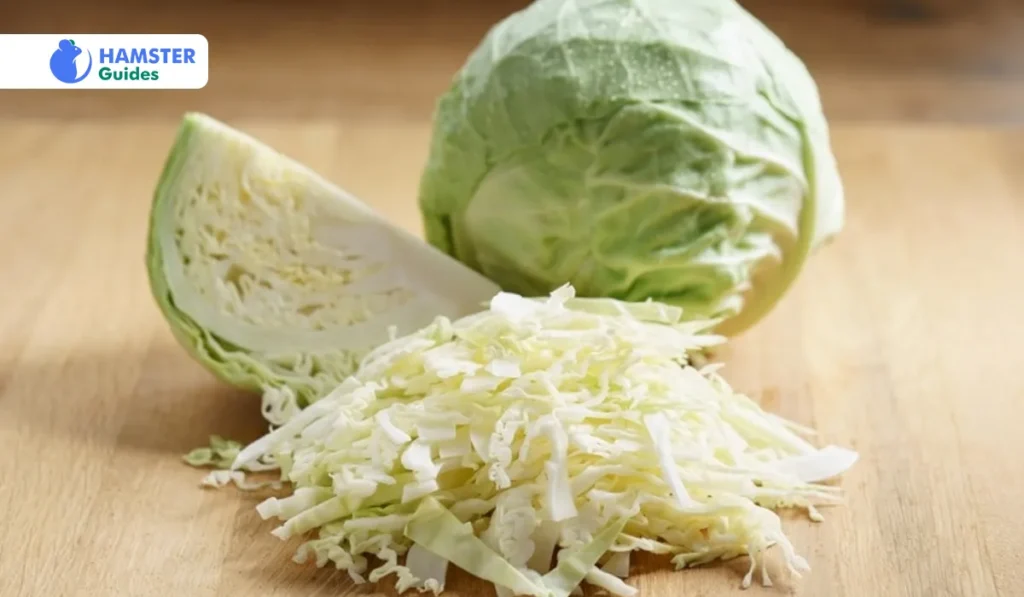
Cabbage belongs to the Brassica family and offers numerous nutritional benefits. It’s rich in vitamin C for immune support, vitamin K for bone health and blood clotting, and dietary fiber for digestion. However, like all cruciferous vegetables, cabbage contains compounds called goitrogens that can interfere with thyroid function if consumed in large amounts. This is why moderation is the golden rule when feeding cabbage to hamsters.
Cabbage Nutrition: What Makes It Beneficial for Hamsters?
Understanding cabbage’s nutritional profile helps explain both its benefits and why portion control matters. Here’s what 100 grams of cabbage contains (note that hamsters eat far less than this):
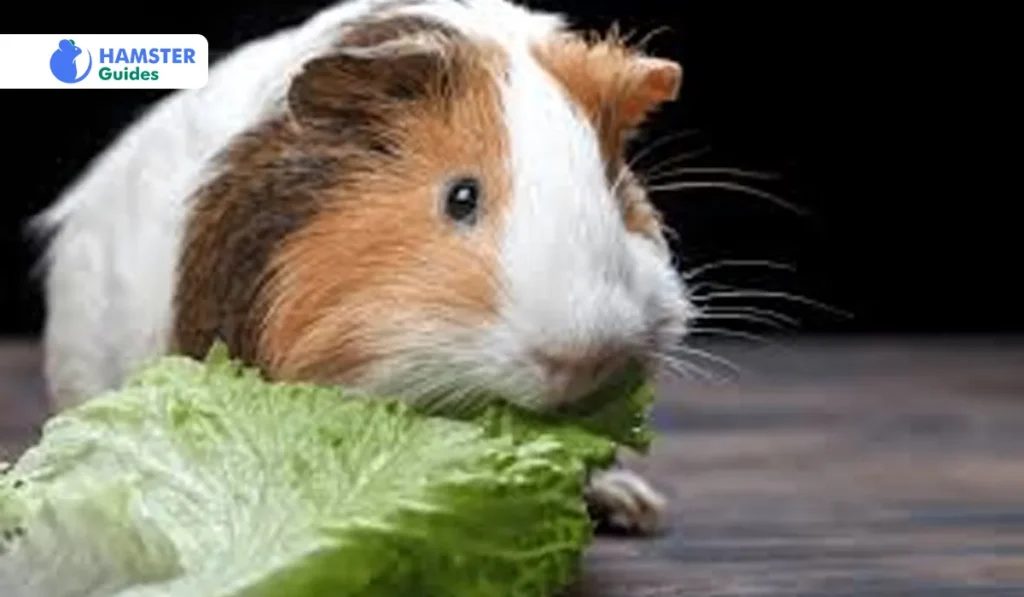
Here is a table of approximate values of the nutrients that cabbage contains:
| Nutrient | Amount per 100g |
| Vitamin C | 36.6mg |
| Vitamin K | 76microg |
| Manganese | 0.160mg |
| Potassium | 170mg |
| Magnesium | 12mg |
| Fibre | 2.5g |
| Natural sugars | 2.9g |
| Sugar | 2.9g |
| Calories | 22 |
| Carbohydrate | 5.2g |
This nutrient density makes cabbage a valuable occasional addition, but the high water content (approximately 92%) and fiber mean that overfeeding can quickly overwhelm a hamster’s delicate digestive system.
Health Benefits: Why Cabbage Can Be Good for Hamsters
The leafy green vegetable cabbage belongs to the Brassica family. As with other vegetables in the family, such as cauliflower, broccoli, and kale, cabbage is low in calories but high in nutrients. When fed appropriately, cabbage offers several advantages for hamster health:
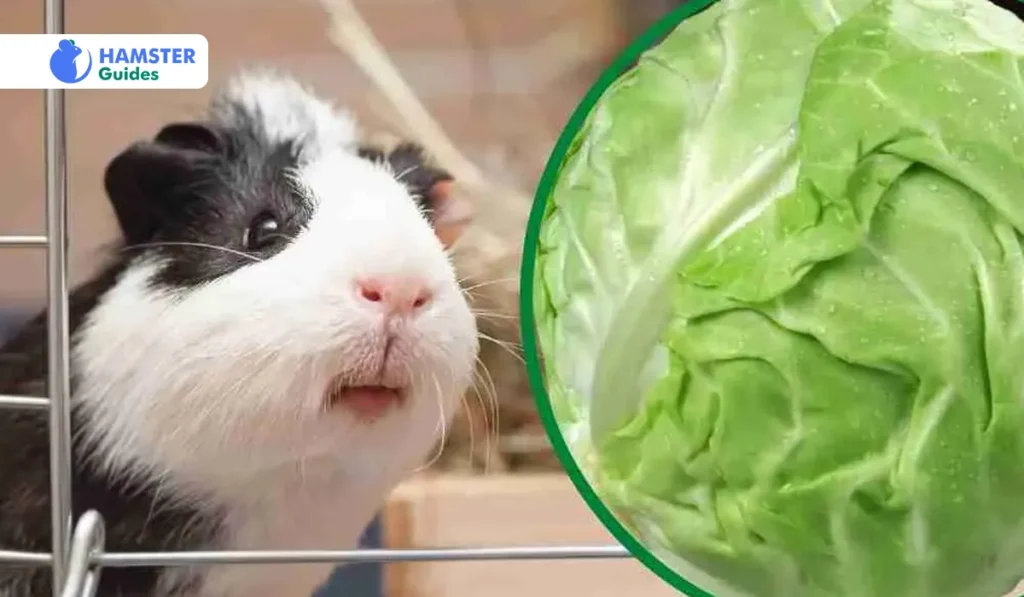
That’s what makes it a perfect choice for your hamsters. Moreover, cabbage is beneficial in several ways, as mentioned below:
Read More: How To Take Care Of A Hamster?
Safe Serving Sizes: How Much Cabbage Can Hamsters Eat?
Proper portion control is absolutely essential when feeding cabbage to prevent digestive problems. The appropriate serving size varies by hamster species due to differences in body size and metabolic sensitivity.
Syrian Hamsters: Offer half a teaspoon (approximately the size of your thumbnail or the hamster’s ear) of chopped cabbage once or twice per week. Syrian hamsters are larger and can handle slightly more fresh vegetables than dwarf varieties.
Dwarf Hamsters (Campbell’s, Winter White, Chinese): Provide a 1-inch piece of cabbage leaf (about half the portion for Syrians) once every 7-10 days maximum. Dwarf hamsters have highly sensitive digestive systems and are prone to diabetes, requiring stricter portion control for all fresh foods.
Roborovski Hamsters: Despite being a dwarf species, Roborovskis have digestive systems more similar to Syrian hamsters. Offer half a teaspoon once or twice weekly, the same as Syrians.
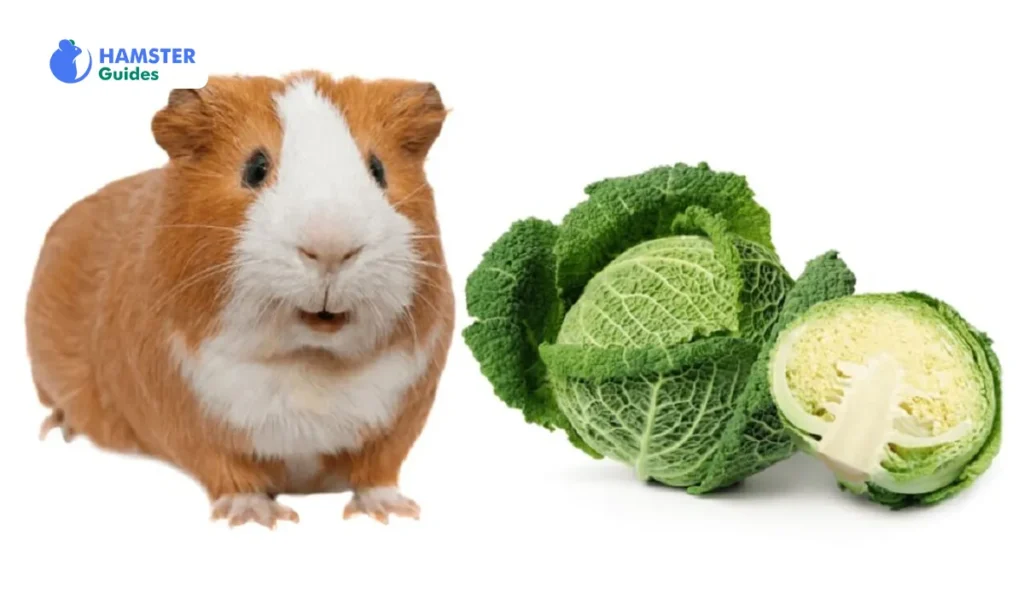
Important Feeding Guidelines:
- This portion size represents the total fresh vegetable allowance for that feeding, not just cabbage.
- Space out servings, never feed cabbage on consecutive days.
- When introducing cabbage for the first time, start with an even smaller piece (pea-sized) and monitor for 24-48 hours.
- If your hamster shows any signs of diarrhea, gas, or lethargy, discontinue cabbage and consult your veterinarian.
Remember that overfeeding fresh produce is one of the most common causes of digestive illness in pet hamsters. While your hamster may eagerly eat more, restraint protects their health.
How to Safely Prepare Cabbage for Your Hamster
Proper preparation ensures cabbage is both safe and appealing for your hamster:
Step 1 – Wash Thoroughly: Rinse cabbage leaves under cool running water to remove all pesticides, dirt, bacteria, and environmental contaminants. Organic cabbage is preferable when available, as conventional cabbage may contain chemical residues that hamsters struggle to process.
Step 2 – Check Structural Integrity: Examine the cabbage for sharp edges or tough, stringy fibers. The structural components must be appropriate for your hamster’s delicate cheek pouches, where they store food. Sharp or abrasive pieces can cause injury, inflammation, or dangerous impaction.
Step 3 – Cut Appropriately: Slice cabbage into thin strips or small, non-stringy cubes no larger than the recommended portion size. For dwarf hamsters, pieces should be even smaller to prevent choking hazards.
Step 4 – Serve Fresh: Offer the cabbage at room temperature. Never feed cold food directly from the refrigerator, as temperature shock can upset digestion.
Step 5 – Remove Uneaten Portions: This is critical, hamsters instinctively hoard food. Fresh vegetables left in bedding or hideouts quickly develop mold and bacterial contamination, which can cause severe illness. Remove any uneaten cabbage within 2-4 hours of feeding, and daily check hiding spots for stashed vegetables.
Can Hamsters Eat Different Types of Cabbage?
Hamster owners often wonder whether specific cabbage varieties are safe. Here’s what you need to know:
Can Hamsters Eat Red Cabbage?
Yes, hamsters can safely eat red cabbage (also called purple cabbage). It contains the same nutritional profile as green cabbage with even higher antioxidant levels due to its anthocyanin pigments. Feed in the same small portions, half a teaspoon for Syrian hamsters, smaller amounts for dwarfs.
Can Hamsters Eat Purple Cabbage?
Purple cabbage is simply another name for red cabbage, and it’s completely safe for all hamster species when fed in moderation. The vibrant color comes from beneficial plant compounds, not anything harmful. Dwarf hamsters can enjoy purple cabbage following the same guidelines: small 1-inch pieces once every 7-10 days.
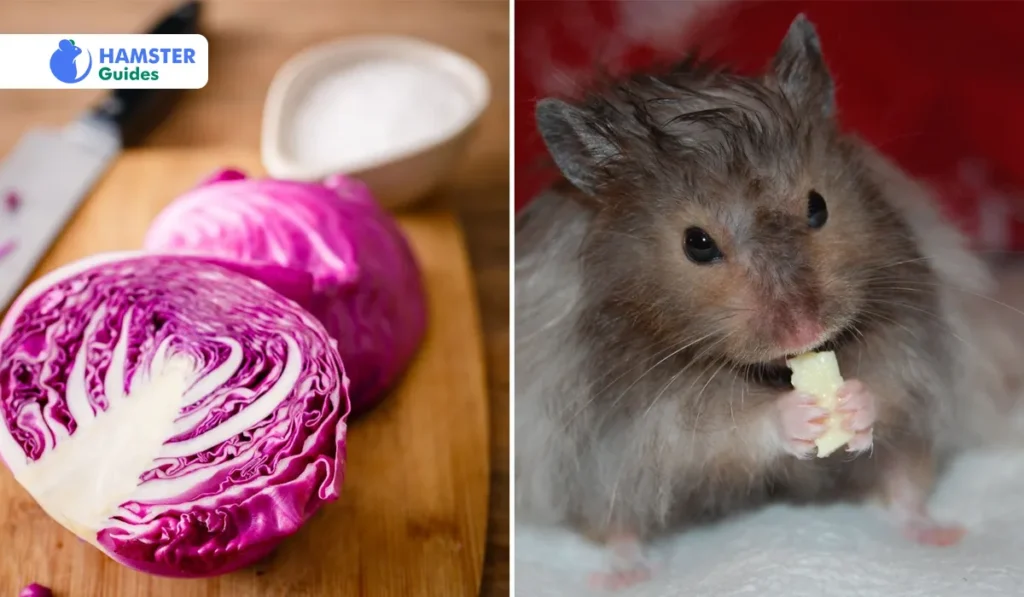
Can Hamsters Eat Raw Cabbage?
Absolutely, raw cabbage is actually preferable to cooked. Hamsters aren’t accustomed to cooked foods in their natural diet, and raw cabbage provides better texture for dental health. Just ensure you wash it thoroughly and cut it into appropriate sizes.
Can Hamsters Eat Cabbage Leaves?
Yes, cabbage leaves are the healthiest and safest part to feed. Choose inner leaves when possible, as outer leaves accumulate more pesticide residue. Always wash leaves thoroughly and tear or cut them into manageable pieces.
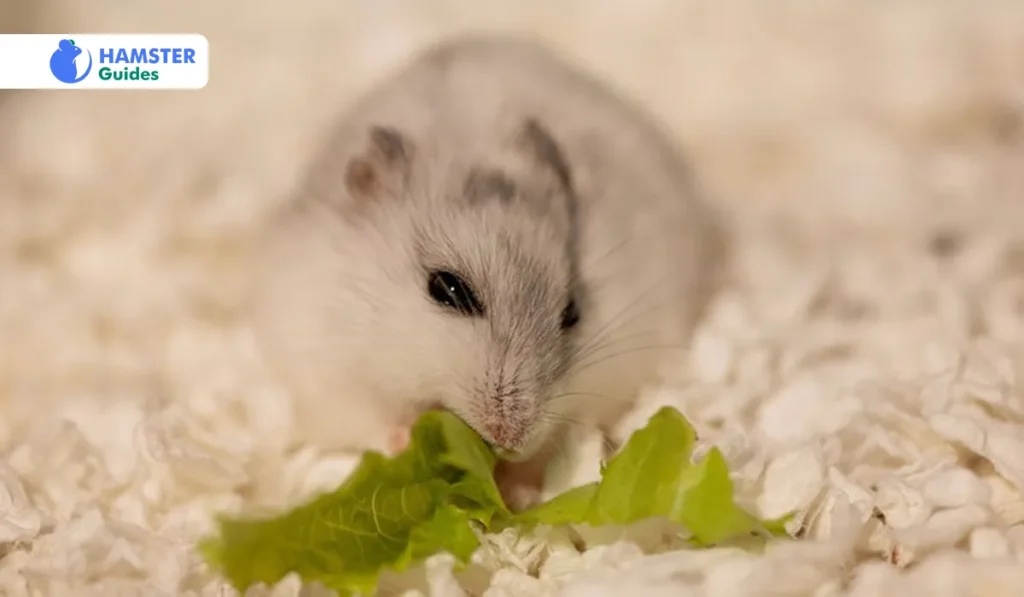
Can Hamsters Eat Cabbage Stalks or Stems?
Cabbage stalks are technically safe but much tougher and harder to chew than leaves. For Syrian and Roborovski hamsters, you can offer a tiny piece of stalk to see if they enjoy nibbling it, some hamsters like the crunch. However, avoid giving stalks to dwarf hamsters entirely, as the tough texture poses choking risks and provides little nutritional value. If offering stalks, cut them into very small, manageable pieces.
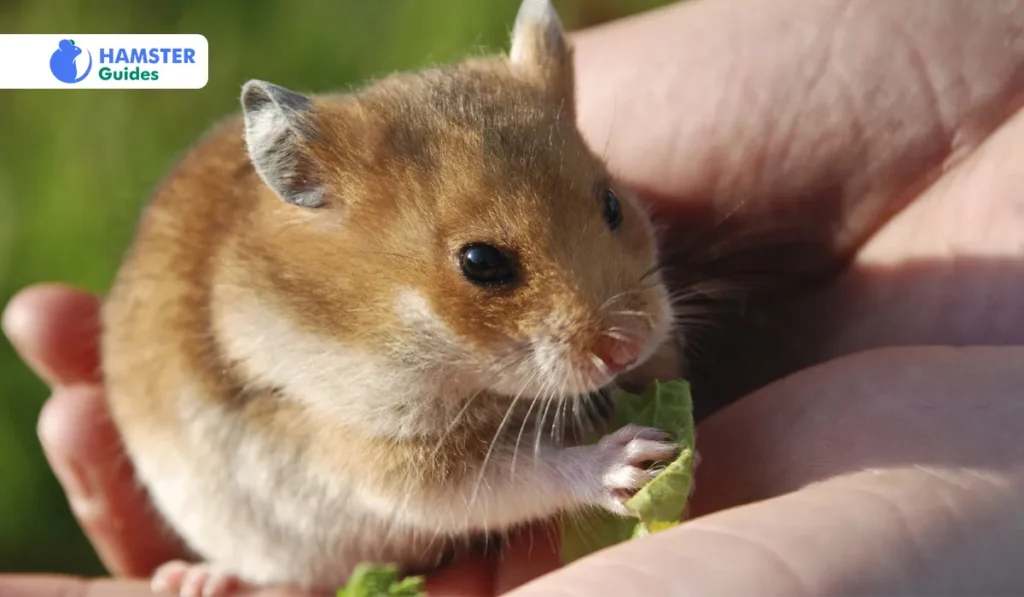
Can Hamsters Eat Cabbage Seeds?
It’s best to avoid cabbage seeds. While not toxic, they offer no nutritional benefits and could pose choking hazards. Stick to feeding leaves and occasional small stalk pieces.
Understanding the Risks: Why Too Much Cabbage Is Dangerous
While cabbage offers benefits, overfeeding creates serious health risks that every hamster owner must understand:
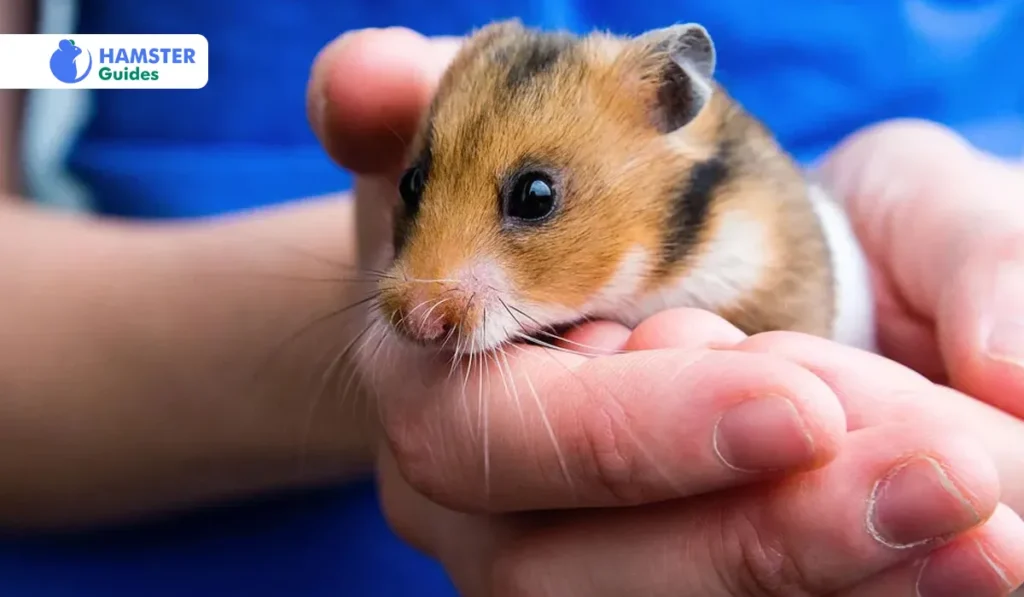
Risk #1: Digestive Distress from Water and Fiber Overload
This is the most immediate danger. Cabbage contains high levels of both water (92%) and indigestible fiber, plus complex sugars called oligosaccharides. When hamsters consume too much too quickly, their delicate digestive systems become overwhelmed.
Undigested oligosaccharides reach the large intestine where gut bacteria ferment them, producing excessive gas. This leads to painful bloating, cramping, and discomfort. The high water content accelerates gut motility, causing watery diarrhea.
This fluid loss can rapidly progress to dangerous dehydration. In severe cases, diarrhea may develop into wet tail syndrome, a serious condition requiring immediate veterinary intervention. This rapid-onset risk is precisely why portions must stay thumbnail-sized or smaller.
Risk #2: Thyroid Concerns from Goitrogenic Compounds
Cabbage and other cruciferous vegetables contain goitrogens, compounds that interfere with iodine absorption and utilization. Iodine is essential for producing thyroid hormones that regulate metabolism.
In high, chronic doses, goitrogen interference can cause thyroid gland enlargement (goiter). However, this risk is easily managed. High-quality commercial hamster pellets provide balanced iodine, so occasional small cabbage servings are highly unlikely to cause thyroid problems. The key is limiting total intake of all cruciferous vegetables (cabbage, broccoli, cauliflower, kale) combined.
Risk #3: Kidney Stones from Oxalate Buildup
Cabbage is classified as a high-oxalate food. Oxalates are organic compounds that bind with calcium and other minerals, potentially forming urinary stones. Urolithiasis (urinary tract stones) is a recognized recurrent disease in hamsters.
Veterinary treatment protocols for hamster urolithiasis focus on dietary management to avoid mineral salt and oxalate excess. The strict once-weekly feeding limit for cabbage, and other high-oxalate greens like spinach, prevents cumulative oxalate buildup that predisposes hamsters to painful stone formation.
Risk #4: Pesticide and Chemical Exposure
Non-organic cabbage may be treated with pesticides, fungicides, and growth accelerators. Hamsters’ small bodies and sensitive metabolisms cannot cope with these toxic substances. Always choose organic cabbage when possible, and wash all produce thoroughly regardless of source.
Risk #5: Diuretic Effects and Dehydration
Cabbage has mild diuretic properties, stimulating the body to lose water through increased urination. Combined with diarrhea from overfeeding, this creates compounding dehydration risk. Always ensure your hamster has access to fresh, clean water, and monitor hydration status when introducing any new food.
Additional Information: Inorganic cabbage is sprayed with numerous chemicals, and hamsters struggle to cope with these toxins. Therefore, it is better to offer only organic cabbage to your hamsters.
Special Considerations for Dwarf Hamsters
Dwarf hamster species (Campbell’s, Winter White, Chinese, and to some extent Roborovski) require extra caution with all fresh foods, including cabbage.
These tiny hamsters possess highly sensitive digestive systems that react more strongly to dietary changes. Certain dwarf species are also genetically predisposed to diabetes, making sugar content in any food, even natural sugars in vegetables a concern.
When feeding cabbage to dwarf hamsters:
- Start with an even smaller test portion (smaller than a pea)
- Observe for 48 hours before offering again
- Limit frequency to once every 7-10 days maximum
- Watch carefully for any signs of soft stool or behavior changes
- If your dwarf hamster has been diagnosed with diabetes, consult your veterinarian before offering any fresh vegetables
While purple and red cabbage are safe for dwarf hamsters, their overall system sensitivity means any new food must be introduced slowly and observed carefully for adverse reactions.
Building a Complete Hamster Diet Beyond Cabbage
Cabbage should be just one small component of a varied, balanced diet. Here’s what to feed your hamster for optimal health:
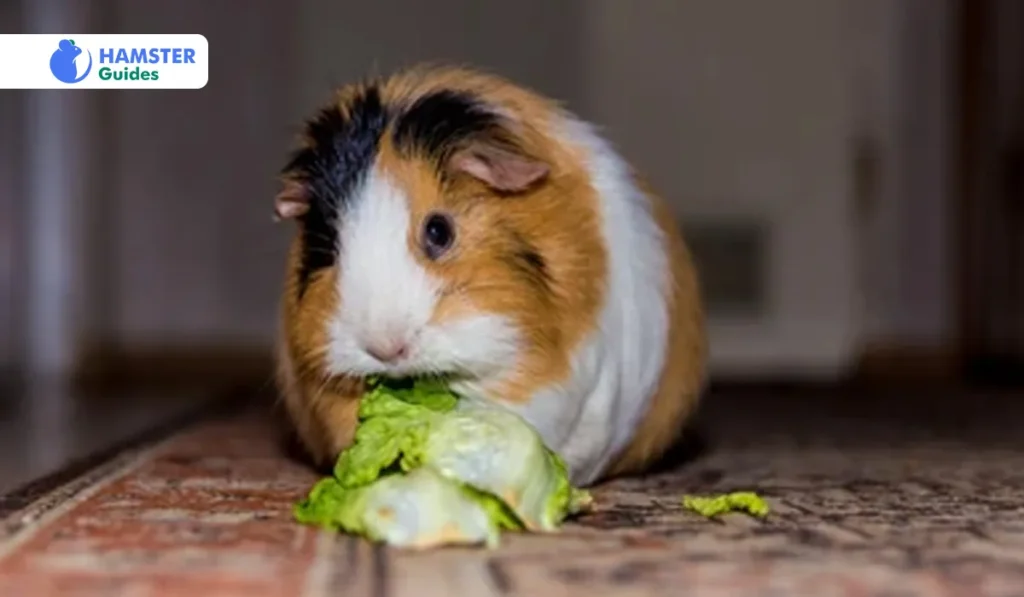
Foundation: High-Quality Pellets (Daily)
Pelleted hamster food specially formulated for hamsters should comprise the majority of your pet’s diet. Choose a quality brand and follow label instructions for quantity, typically 1/8 to 1/3 cup daily depending on your hamster’s size and species.
Pellets provide complete, balanced nutrition including the iodine that prevents goitrogen-related thyroid issues.
Avoid muesli-style mixtures, as hamsters often pick out high-sugar, high-starch pieces while rejecting nutritious pellets, leading to nutritional imbalances and dental problems.
Timothy Hay (Always Available)
While not strictly required, timothy hay offers multiple benefits. Hamsters use hay for tunneling and nest-building (mental enrichment), plus nibbling on it promotes dental health by naturally wearing down continuously growing teeth.
Protein Sources (2-3 Times Weekly)
Hamsters are omnivores requiring protein. Offer commercially available hamster treats containing mealworms or crickets, or provide tiny amounts of cooked plain chicken or hard-boiled egg.
Read More: How To Take Care Of A Hamster?
Frequently Asked Questions
Final Recommendations: Making Smart Feeding Decisions
Cabbage can be a nutritious, enriching addition to your hamster’s diet when treated as the occasional treat it should be. By following strict portion guidelines—half a teaspoon for Syrian hamsters once or twice weekly, smaller amounts for dwarfs every 7-10 days—and ensuring careful preparation, you can safely offer this vegetable while minimizing health risks.
Remember these key principles:
- Pellets first: Commercial hamster pellets should form 80-90% of the diet
- Variety matters: Rotate different safe vegetables rather than relying on any single type
- Start small: Introduce any new food gradually with tiny test portions
- Watch closely: Monitor your hamster’s droppings and behavior after new foods
- When in doubt, leave it out: If unsure about a food’s safety, don’t risk it
- Fresh water always: Maintain constant access to clean drinking water
- Remove uneaten portions: Check hiding spots daily and remove old fresh food
Your hamster can enjoy the crunch and nutritional benefits of cabbage while you enjoy peace of mind knowing you’re feeding safely and responsibly.
If your hamster shows any signs of digestive distress, lethargy, or wet tail symptoms, contact your veterinarian immediately. Early intervention is critical for serious conditions.







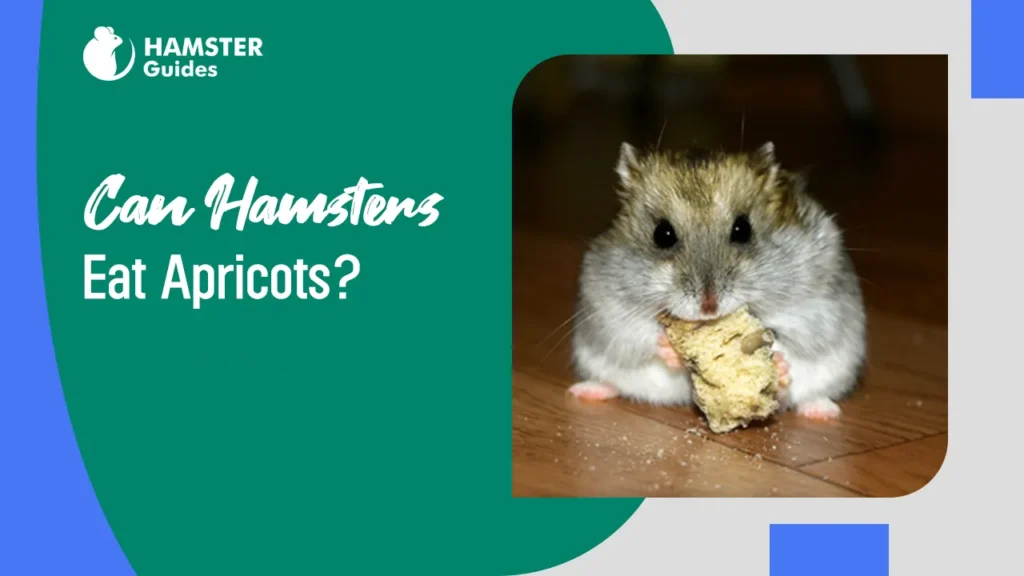

Leave a Reply